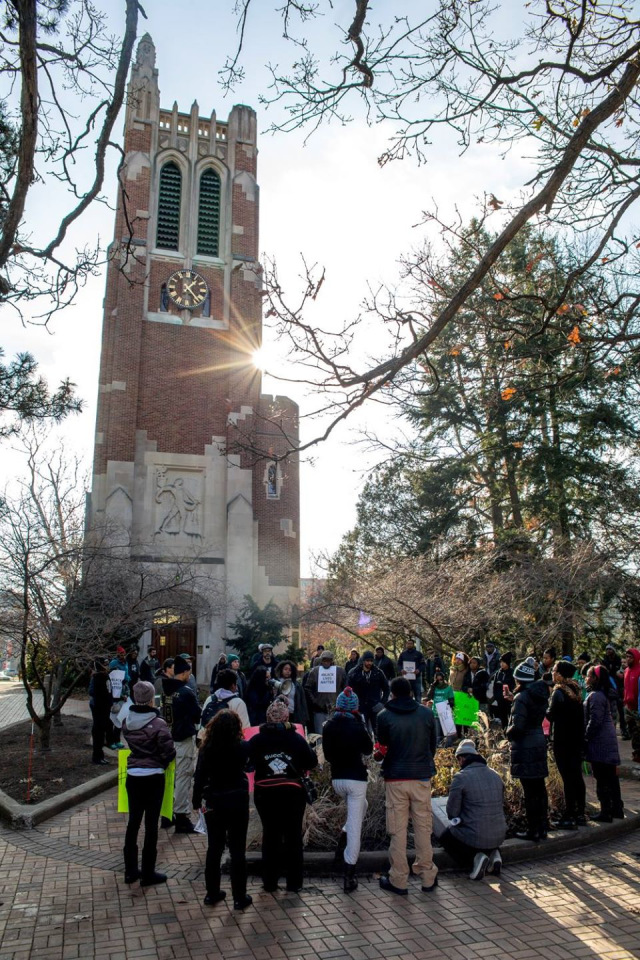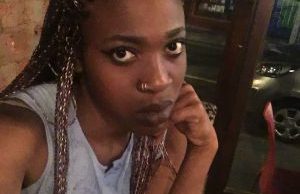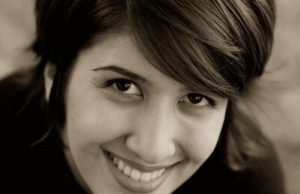Breaking News: An Open Letter of Love to Black Students: #BlackLivesMatter Dec

Black students and professors, Beaumont Tower, Michigan State University, December 6, 2014. photo by Darryl Quinton Evans
We are Black professors.
We are daughters, sons, brothers, sisters, cousins, nieces, nephews, godchildren, grandfathers, grandmothers, fathers, and mothers.
We’re writing to tell you we see you and hear you.
We know the stories of dolls hanging by nooses, nigger written on dry erase boards and walls, stories of nigger said casually at parties by White students too drunk to know their own names but who know their place well enough to know nothing will happen if they call you out your name, stories of nigger said stone sober, stories of them calling you nigger using every other word except what they really mean to call you, stories of you having to explain your experience in classrooms—your language, your dress, your hair, your music, your skin—yourself, of you having to fight for all of us in classrooms where you are often the only one or one of a few, stories of you choosing silence as a matter of survival.
Sometimes we’re in those classrooms with you.
We know there is always more people don’t see or hear or want to know, but we see you. We hear you.
In our mostly White classrooms we work with some of you, you who tell us other professors don’t see, don’t hear you. You, who come to our offices with stories of erasure that make you break down. They don’t see me, you say. They don’t hear me. We know and don’t know how to hold your tears.
How do we hold your tears, and your anger?
You are our sons and daughters, our brothers and sisters, our mothers, our fathers, our godchildren. You, with your stories of erasure break our hearts because you are family, because your stories of erasure ultimately are stories of violence, because your stories mirror our experiences, past and present.
Right now. This is all happening now. Every day. We know this.
We want you to hear.
You tell us your stories and sometimes we tell you our own stories of cops who stop us on the way to work, of grandparents born in Jim Crow, of parents born during segregation into an economic reality that made them encourage us to get solid jobs, of parents born outside the United States who came face-to-face with the harsh reality of U.S. anti-Blackness, how we chose institutions where we often feel alone. We tell you stories of almost dropping out of school, stories of working harder than anyone else even when it felt like it was killing us, even when it is killing us. We tell you we know historically and predominantly White universities might let you/us in, but they don’t care much about retaining us no matter how many times they misuse pretty words like diversity, or insult us with the hard slap of minority.
We tell you about the underground network of folks who helped us, the people who wrote us letters, the offices we cried in, the times we were silent, the times we spoke up, the times we thought we wouldn’t make it, the people who told us to hold on. We tell you over and over about the railroad of Black professors and other professors of color who we call when we know one of us is in need. We remind you skinfolk isn’t always kinfolk. We tell you to be careful. We tell you to take risks. We tell you, guard your heart. We tell you, keep your heart open. We tell you to hold on. Hold on, we say, to you, to us, because holding on to each other is everything, often the only thing.
Hold on.
We want a future for you, for us right now.
We write this is in solidarity with the families of Tamir Rice, Mike Brown, Renisha McBride, Trayvon Martin, Rekia Boyd, Aiyana Stanley Jones, and so many others who they are killing, so many others who should have had the chance to be in our classrooms, who should have had the chance to simply be.
We write this in solidarity with Harriet Tubman, Ida B. Wells, Frederick Douglass, Sojourner Truth, Malcolm X, Martin Luther King, and too many others stolen and gone, too many others who fought for us to be in this privileged place where we still have to fight for justice.
We write this in solidarity with The Combahee River Collective and #BlackLivesMatter who knew and know we have to fight for and love all of us if any one of us is going to survive.
We write this in solidarity with you, Black students, here and elsewhere, and with those on the ground for over 100 days, four and a half hours, two seconds.
The living and the dead. We hear you. We see you.
In our classes we’ll continue to do what we’ve always done: teach about race, anti-blackness, and White Supremacy. This has and will continue to put us in positions we have to defend. This has and will continue to compromise our jobs, our health, our relationships with other people who profess to be our colleagues. This has and will compromise relationships with partners who tell us with love we need to set better boundaries.
We’re trying.
We study ourselves. We study, we live Black lives. We organize. We strategize. We march. We teach to nurture and resist. We don’t always talk about the letters we write to administrators, the angry emails we send, the committees and task forces we serve on, the department meetings where we question and push for more, the colleagues who question our research, our presence, our skin, our manner of being. We don’t always talk about the weight of pushing for more, more being basic equity, more being the right to exist without explanation or apology, more being the right to love and be loved.
What we do is not enough. It’s never enough, but we’ll keep on. We’ll keep finding ways to do more. For all of us.
We’re supposed to say views expressed herein are ours alone, but we believe that truth to be self-evident.
Some people who share our views will not sign this but they’re still with us. The living and the dead.
We’ve never been alone.
You already know your life matters. Know we’re fighting with you and for you. With all of us. For all of us.
We got you.
We see you. We hear you. We love you.
********
Rae Paris, Michigan State University
Django Paris, Michigan State University
Jessica Marie Johnson, Michigan State University
Brian G. Gilmore, Michigan State University
Michael J. Dumas, New York University
Terry Flennaugh, Michigan State University
Tama Hamilton-Wray, Michigan State University
Jeff Wray, Michigan State University
Yomaira Figueroa, Michigan State University
Tacuma Peters, Michigan State University
Michelle A. Purdy, Washington University in St. Louis
Adrienne Dixson, University of Illinois at Urbana-Champaign
Maisha T. Winn, University of Wisconsin-Madison
Dorinda J. Carter Andrews, Michigan State University
Terrion Williamson, Michigan State University
Karla FC Holloway, Duke University
Kiese Laymon, Vassar College
Chezare A. Warren, Michigan State University
Shaun R. Harper, University of Pennsylvania
Adam J. Banks, University of Kentucky
Metta Samá, Salem College
Tamara Butler, Michigan State University
Lisa Ze Winters, Wayne State University
Ebony Elizabeth Thomas, University of Pennsylvania
Valerie Kinloch, The Ohio State University
Ibram X Kendi, University at Albany-SUNY
NiCole T. Buchanan, Michigan State University
Geneva Smitherman, Michigan State University
Keisha L. Green, University of Massachusetts Amherst
Terah Venzant Chambers, Michigan State University
Glenn Chambers, Michigan State University
David E. Kirkland, New York University
Brittney Cooper, Rutgers University
Mark Anthony Neal, Duke University
Tamura Lomax, Virginia Commonwealth University
Treva Lindsey, The Ohio State University
If you are a Black professor and would like to add your name, please email blackspaceblog@gmail.com with your name as you would like it to appear, along with your institution. You can also visit blackspaceblog to view the original letter.




11 Comments